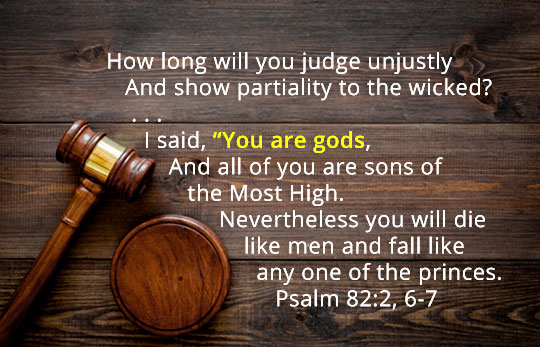Bible Question:
In John 10:34 Jesus says we are gods. But where in the law of Moses does it say we are gods? Psalm 82:6 does not say we are gods because that is David writing. Jesus said, is it not written in your law; I said you are gods?
Bible Answer:
Some cults will distort the meaning of John 10:34 by claiming that Jesus announced that we are gods. Here is John 10:34.
Jesus answered them, “Has it not been written in your Law, ‘I said, you are gods’?” John 10:34 (NASB)
Unfortunately, some Christians are confused about the wording since they do not know that Jesus was referring to Psalm 82:6. Let us examine the scriptures to answer the question, “Does Psalm 82:6 say we gods?”

Meaning of “Your Law”
The Jews used the term “The Law” in a variety of ways. First, they used it to refer to the first five books of the Old Testament (Daniel 9:11, 13; Malachi 4:4; Matthew 22:36; Luke 2:2, 24; John 1:17; 7:19, 23; 8:5), which is also called the Pentateuch (Genesis-Deuteronomy) or the Torah. Matthew 22:36 is an excellent example where we are told that Jesus was asked what is the great commandment in the Law. In Jesus’ reply we discover that He quotes from Deuteronomy 6:5, which Moses wrote.
Teacher, which is the great commandment in the Law?” And He said to him, “‘YOU SHALL LOVE THE LORD YOUR GOD WITH ALL YOUR HEART, AND WITH ALL YOUR SOUL, AND WITH ALL YOUR MIND.’” Matthew 22:36 (NASB)
The term “the Law” also was used to refer to the Tanakh, which Christians call the Old Testament. For example in John 12:34, a crowd said that the Law stated the Christ would remain forever. It is important to know that there are no references to the Messiah remaining forever in the Pentateuch. But there are references to the Messiah reigning forever in Psalm 89:35-37; Isaiah 9:6-7; Daniel 7:13-14 and Ezekiel 37:24-25. This helps us understand that the term “the law” also was used to refer to the entire Old Testament.
Another example, of the term “the law” also referring to the entire Old Testament occurs in 1 Corinthians 14:21.
In the Law it is written, “BY MEN OF STRANGE TONGUES AND BY THE LIPS OF STRANGERS I WILL SPEAK TO THIS PEOPLE, AND EVEN SO THEY WILL NOT LISTEN TO ME,” says the Lord. 1 Corinthians 14:21 (NASB)
The quote in this verse is a paraphrased translation of Isaiah 28:11-12. Therefore, we have another example of “the Law” referring to verses outside of the first five books of the Old Testament (Genesis-Deuteronomy). That is, the term “the Law” could also refer to the entire Old Testament.
The Treasury of Scripture Knowledge provides this insight into the term “the Law.” It refers to 1 Corinthians 14:21.
The passage quoted is taken from the prophet Isaiah; but the term torah, LAW, was used by the Jews to express the whole Scriptures, law, prophets, and hagiographia; and they used it to distinguish these Sacred Writings from the words of the scribes. It is not taken from the LXX., from which it varies as much as any words can differ from others where the general meaning is similar. It accords much more with the Hebrew; and may be considered as a translation from it; ‘only what is said of God in the third person, in the Hebrew, is here expressed in the first person, with the addition of λεγει Κυριος,’ saith the Lord.—Dr. RANDOLPH. Jno. 10:34. Ro. 3:19. With. De. 28:49. Is. 28:11, 12. Je. 5:15.[1]
Meaning of “You Are Gods”
Now that we know the term “the Law” can refer to either the first five books of the Old Testament or the entire Old Testament, we can answer the question, “Did Jesus say we are gods?” It is helpful to know that Jesus referred to Psalm 82:6 when in John 10:34 He said, “You are gods.”
I said, “You are gods,
And all of you are sons of the Most High.”
Psalm 82:6 (NASB)
This statement in Psalm 82:6 is an insulting comment on the judges of Israel (Psalm 82:1).
God takes His stand in His own congregation;
He judges in the midst of the rulers.
Psalm 82:1 (NASB)
In this verse the Psalm rebukes the judges when it says they ruled unjustly. The message of the Psalm is that they ruled as if they were gods. They had ignored God, the Judge of judges. Therefore, the Psalmist calls on God to judge the unjust judges of Israel.
Arise, O God, judge the earth!
For it is You who possesses all the nations.
Psalm 82:8 (NASB)
This Psalm helps us understand that it is a rebuke of men who acted as if they were gods. They were not gods. They were simply arrogant, unjust judges.
Conclusion:
There are judges who act as if they are gods in our nations today. They ignore the laws of the nation and impose their own will on their nations. In essence they rewrite the laws of the nation. They rule as if they are gods. Someday God will judge these unjust judges.
Jesus’ message in John 10:35-36 is that if God could refer to men who were not gods, as gods in some sense, then how could the religious leaders condemn Christ for revealing that He was the true God? In addition, the religious leaders were acting like unjust judges. They were like the judges who were condemned in Psalm 82.
References:
1. Jerome Smith. The Treasury of Scripture Knowledge. Thomas Nelson Publishers. p. 1343.
Suggested Links:
Searching For GodAre we little gods? – What does John 10:34 mean?
Why would Jesus say that we are gods?
What is God’s image?